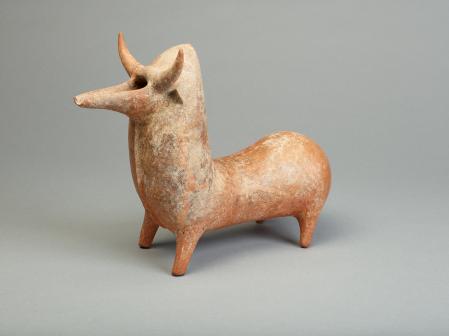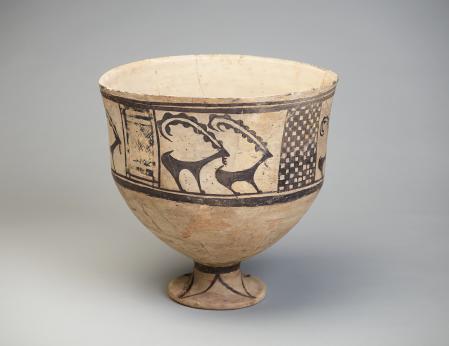Burial gifts from Iran
In Ancient Greek "askos" means a tube: The stomachs of these moulded animal vessels resemble well-filled leather water skins or tubes; the animal figure often refers to a zebu but cannot always be identified unequivocally. In various ancient cultures, such as those in Egypt, Anatolia, and Mesopotamia, clay vessels shaped like animals were produced from the Neolithic Age (6,000 – 4,000 B.C.E.) onwards. A widespread practice in early cultures was to use animal intestines or tubes made from animal skin as vessels for liquids; for this reason, the combination of the function of a vessel with the appearance of an animal seemed logical.
These askoi were found during excavations at an Iron Age burial site in Amlash, in Gilan Province in modern Iran, somewhat south of the Caspian Sea. In the 1960s there was great interest in them in the West, presumably because they are so expressive, and they found their way via dealers into private and institutional collections.
Early Bronze and Iron Age cultures in Iran have still not been sufficiently researched, although the assumption today is that those vessels in complete animal form were created for religious or cultic ceremonies. In Ancient Egyptian culture, animals were also frequently accorded divine powers, for example as guarantors of protection or rebirth. Probably, the askos vessels were burial gifts intended to ensure the deceased persons were well catered for in the next world. In a cultic context, the animal represented thus referred to the revered godhead. Some researchers suggest that animal vessels were expressly used in connection with animal sacrifices. For this reason, the askoi are also designated as libation vessels, i.e., vessels utilized in a ritual ceremony to pour liquid offerings, such as wine or milk, on the ground during the sacrifice.
Share on


